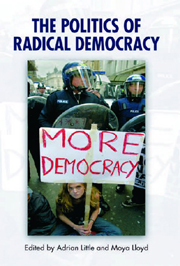Book contents
- Frontmatter
- Contents
- Acknowledgements
- Notes on the Contributors
- Introduction
- 1 Rhetoric and Radical Democratic Political Theory
- 2 Performing Radical Democracy
- 3 Aboriginal Sovereignty and the Democratic Paradox
- 4 Judith Butler, Radical Democracy and Micro-politics
- 5 Post-structuralism, Civil Society and Radical Democracy
- 6 Hegemony and Globalist Strategy
- 7 Is ‘Another World’ Possible? Laclau, Mouffe and Social Movements
- 8 Friends and Enemies, Slaves and Masters: Fanaticism, Wendell Phillips and the Limits of Agonism
- 9 The Northern Ireland Paradox
- Conclusion
- Bibliography
- Index
9 - The Northern Ireland Paradox
Published online by Cambridge University Press: 12 September 2012
- Frontmatter
- Contents
- Acknowledgements
- Notes on the Contributors
- Introduction
- 1 Rhetoric and Radical Democratic Political Theory
- 2 Performing Radical Democracy
- 3 Aboriginal Sovereignty and the Democratic Paradox
- 4 Judith Butler, Radical Democracy and Micro-politics
- 5 Post-structuralism, Civil Society and Radical Democracy
- 6 Hegemony and Globalist Strategy
- 7 Is ‘Another World’ Possible? Laclau, Mouffe and Social Movements
- 8 Friends and Enemies, Slaves and Masters: Fanaticism, Wendell Phillips and the Limits of Agonism
- 9 The Northern Ireland Paradox
- Conclusion
- Bibliography
- Index
Summary
We are always writing the history of the same war, even when we are writing the history of peace and its institutions. (Foucault 2003: 16)
Introduction
In recent years there has been a growth in literature attempting to relate the political analysis of Northern Ireland with contemporary themes in democratic theory. These contributions highlight numerous areas of overlapping concern such as the possibilities for conflict resolution (Horowitz 2002; McGarry and O'Leary 1996, 2008; O'Flynn 2004), the role of deliberative democracy in understanding justice (O'Neill 2000, 2002; Newey 2002; Little 2003a) and the different interpretations of the ‘problem’ in Northern Ireland (Finlayson 2006; Vaughan-Williams 2006). These works have helped to fill a breach in the literature on Northern Ireland because for many years it was treated as a unique society which was divorced from the normal preoccupations of democratic theory. In demonstrating that political philosophy can contribute considerable insight into the analysis of politics in Northern Ireland, this literature has served a very useful purpose, although questions remain over the wisdom of applying liberal ideas of democracy to the situation in Northern Ireland (Little 2004, 2003b). Perhaps, then, given these questions, the politics of Northern Ireland and its future might be debated in terms of the limitations of the democratic paradigm and, in particular, the contribution that theories of radical democracy might be able to offer to our understanding of the problems that Northern Ireland engenders.
This chapter outlines the basic tenets of radical democratic theory, the reasons why it can provide an innovative reading of the Northern Ireland conflict and its implications for future political developments in the province.
- Type
- Chapter
- Information
- The Politics of Radical Democracy , pp. 179 - 198Publisher: Edinburgh University PressPrint publication year: 2008

